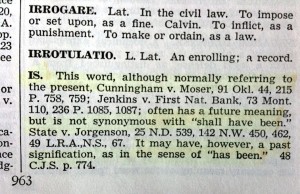
The definition of “is”, is….
Who knew “Is” had three different and opposing meanings?
Blacks Law Dictionary, 4th Edition, page 963
IS. This word although normally applying to the present often has a future meaning, but is not synonymous with “shall have been.” It may have, however, a past signification, as in the sense “has been.”
Does Bill Clinton’s question actually make sense to you when you understand that there are three different meanings for “is” therefore there can be three different answers depending on which definition of “is” was intended by the questioner?
The phrase “that depends on what your definition of “is”, is”, made famous by then president of the United States Bill Clinton while testifying at his “sex scandal” grand jury investigation, raised the hackles on people everywhere.
“How dare he play word games?”,
“who does he think he is?”,
“shame on him, he’s the president!”
I just heard another person reference to the idea that he was playing games.
He was not…. and here’s the story why.
Bill is a lawyer. And as we all know, but don’t really understand, the law has it’s own language, and believe it on not, the word “is” has been given MULTIPLE meanings in law.
WHAT?
That’s right. In a legal environment, legal situation or legal process the words that are used may carry the meaning defined in law dictionaries, not the everyday meaning you find in english dictionaries.
Think about this. What is the purpose of a dictionary? To define words. To define new words, old words and environment specific words. There is a financial dictionary and a computer dictionary and a law dictionary and many more. Why? Because each field creates special words unique to its field and also has everyday words that mean something different from everyday english usage.
For example, in everyday english “net” means a bunch of different things (http://dictionary.reference.com/browse/net ) but in financial circles it uniquely means “profit or loss on a transaction” (http://financial-dictionary.thefreedictionary.com/net).
It’s important to note that an english dictionary doesn’t carry the financial definition, you need to go to the finance dictionary to see if it has a special meaning in that field. It does, so that’s what it can also mean when used in a financial field reference, but not always. Confused yet?
Likewise, in legal environments, the word person can mean a “human being” or a “corporation”, but in everyday english it only means “human being”. Yes, you can look it up!
Coming back to that little word “is”. We all know it means present tense, the way things are…errr is. You know what I mean.
But those rascals in law, who love grey areas of doubt, uncertainty and confusion (apparently) have found it useful, for some reason, to create [free-reg] THREE (yes 3) DIFFERENT meanings for the the word “is”.
A good lawyer would know this, understand this and if asked a question that used the word “is” would rightfully ask, “which meaning of “is” are you referring to, because my answer may be different depending on which “is” you are asking about”. Which is exactly what Bill Clinton did.
Now that actually makes sense if a word has different meaning to ask clarification as to which meaning to consider. Its intelligent
Having three definitions for the word “is” may not be intelligent, but knowing that there are in fact three in a legal context is smart and therefore one SHOULD ask for clarity before answering a question that contains the word “is”.
And that is what “slick willy” did. He was not being evasive, disrespectful or playing games. He understood that “is” could mean three very different things and he needed to know which one was being asked about… before he answered the question. He was involved in a legal process at the time, so it was a fair, educated and an intelligent question to ask… which legal definition fits the question Mr. Question Asker?
Still don’t believe “is” has three different meanings in law?
Here you go, from Blacks Law Dictionary a primary reference legal dictionary in use for decades:
Blacks Law Dictionary, 4th Edition, page 963
IS. This word although normally applying to the present often has a future meaning, but is not synonomous with “shall have been.” It may have, however, a past signification, as in the sense “has been.”
WOW. (Bold and underline emphasis is mine.)
“IS” can often mean “future” although normally means “present”, but may mean “past”. There you have it, proof that law can be crazy.
Maybe, crazy like a fox.
Here is a scan of the page form Blacks Law Dictionary 4th Edition for those who don’t own a copy of Blacks.
Now, next time someone uses a word that you THINK you know what it means, AND it is in a legal context, might you want to look up that word to double check and see if maybe there are other meanings you might need to understand first? To assume you understand could mean that you’re answering the wrong question.
So asking for clarity would be the smart thing to do, even if other people make fun of you for looking up a word that we ALL KNOW it could only have ONE possible meaning. Get it?
People rallied against Bill and to this day still do, but in law he was correct.
To learn more tricks and traps of the legal world, which appear to be designed to ensnare the unsuspecting and uneducated, upgrade to become a free member of private-person.com
***** FREE MEMBER LEVEL ONLY CONTENT! You can sign up as Free Member to get access! *****
To learn more tricks and traps of the legal world and help yourself not be ensnared as one of the unsuspecting and uneducated become a free or donating member of private-person.com



very great stuff, my head is (in the now)smile, getting bigger all right need more input.JT